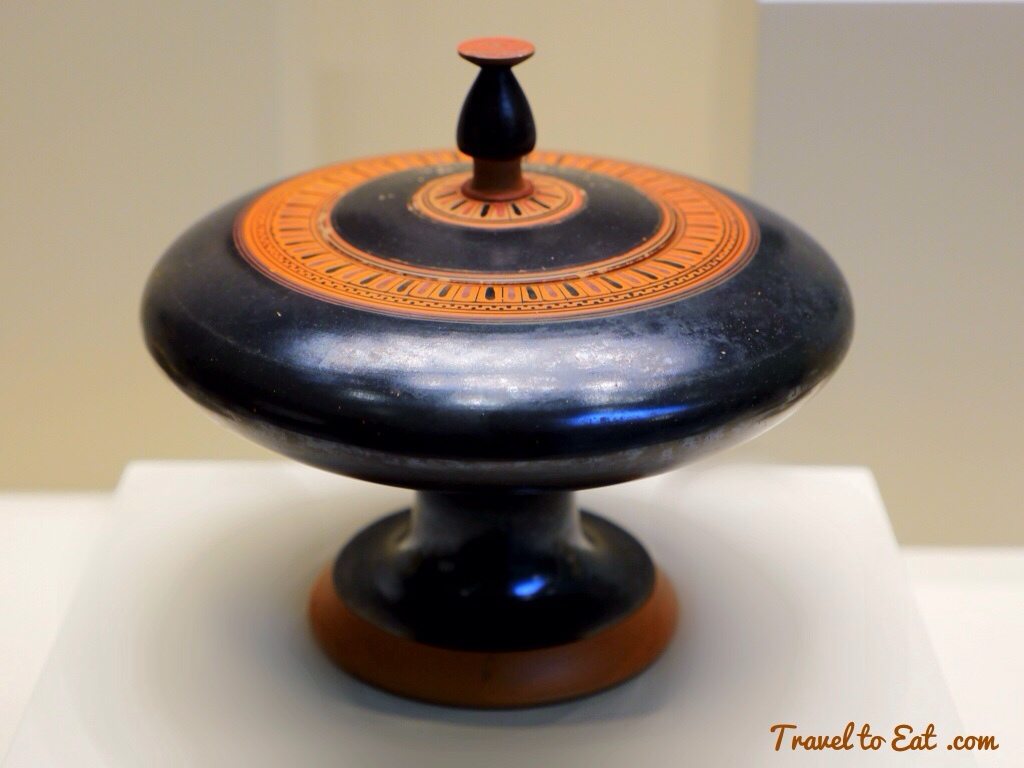Very slowly, we are moving on to the end of the Eleusinian Mysteries. The last few days were dedicated to the transition back to one’s own home, family, community, and work--to the rest of one’s life, with a new way of seeing.
Day nine was called both 'Plemochoai', Pourings of Plenty, and 'Epistrophe', Return. It is possible that these terms describe both the ninth and tenth day, but like much about the Mysteries, this is unclear. This day was a time for offering libations. We are not quite sure to whom, but it makes sense that the libations were twofold, or either of the following: libations to the ancestors as part of the mysteries of the Afterlife, and/or libations to the 'regular' household deities as part of the return to regular life.
 What we do know for certain was that special ritual vessels were used to make these libations. They were called 'plemochoai' and were specific to the Mysteries. They were vessels with a turned-in rim, a high foot, and a lid. Possibly, the same vessels were used to tip out water sacrifices to Demeter and Persephone the day after the major initiation rite.
What we do know for certain was that special ritual vessels were used to make these libations. They were called 'plemochoai' and were specific to the Mysteries. They were vessels with a turned-in rim, a high foot, and a lid. Possibly, the same vessels were used to tip out water sacrifices to Demeter and Persephone the day after the major initiation rite.
'Epistrophe' implies re-crossing boundary between the liminal realm of sacred ritual to return to the more ordinary experiences of daily life. These libations, but also the simple acts of packing bags, cleaning up the fields and sactuaries, and and saying goodbye to newly made friends and acquaintances would have brought with it a sense of normalcy after the long days in which the whole point was to put aside everything normal. In these days, all things regula would slowly have been re-introduced and once ready, it was time to travel back home. The Mysteries were over, but the experience would have lingered forever.
Day nine was called both 'Plemochoai', Pourings of Plenty, and 'Epistrophe', Return. It is possible that these terms describe both the ninth and tenth day, but like much about the Mysteries, this is unclear. This day was a time for offering libations. We are not quite sure to whom, but it makes sense that the libations were twofold, or either of the following: libations to the ancestors as part of the mysteries of the Afterlife, and/or libations to the 'regular' household deities as part of the return to regular life.
 What we do know for certain was that special ritual vessels were used to make these libations. They were called 'plemochoai' and were specific to the Mysteries. They were vessels with a turned-in rim, a high foot, and a lid. Possibly, the same vessels were used to tip out water sacrifices to Demeter and Persephone the day after the major initiation rite.
What we do know for certain was that special ritual vessels were used to make these libations. They were called 'plemochoai' and were specific to the Mysteries. They were vessels with a turned-in rim, a high foot, and a lid. Possibly, the same vessels were used to tip out water sacrifices to Demeter and Persephone the day after the major initiation rite.'Epistrophe' implies re-crossing boundary between the liminal realm of sacred ritual to return to the more ordinary experiences of daily life. These libations, but also the simple acts of packing bags, cleaning up the fields and sactuaries, and and saying goodbye to newly made friends and acquaintances would have brought with it a sense of normalcy after the long days in which the whole point was to put aside everything normal. In these days, all things regula would slowly have been re-introduced and once ready, it was time to travel back home. The Mysteries were over, but the experience would have lingered forever.

No comments:
Post a Comment